WHY RAID
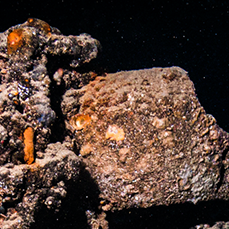
Part of the adventure is getting a chance to look at what’s called “industrial archeology.” For many of us, that translates into simply taking a look at what’s down there!
WHY RAID
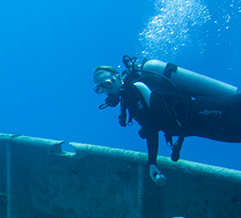
Stay Active, Stay Interested, Stay Diving.
With RAID, You Know What You’re Getting…

AND YOU CAN TELL US WHAT YOU GOT We’ve really tried hard to let divers know exactly what to expect from a RAID class… from an entry-level, open water diver whose adventure is just starting, all the way to a CCR cave diver exploring the darkness 100 metres deep. It starts with FREe-Learning. FREe-Learning opens access to every RAID manual in our library. (Just to be clear, that includes core programs, freediving courses, recreational, DM, Instructor, technical… everything: even the end of chapter quizzes.) And yes, it’s free, and you’re invited! And, not only is it free, it’s ultra convenient too because if you like what you see, the online system lets you pick a local RAID dive centre and sign up for the class on the spot. {LINK} But, all that aside, we also try hard to make sure you (every student for every class in fact) get value for your time and money. At the end of a RAID class, there is a short questionnaire. It lists the skills required by our class standards, and asks if all of them were covered in the class. It’s a basic quality assurance to make sure you got what you paid for. The final piece is an online logbook for each student to log their dives. Certainly, logging the dives associated with the class they just finished, but the app is available anytime for any dive. RAID is about skill-based learning… AKA competency-based learning. We put strong emphasises the importance of practical skills and diver competence throughout a student’s long-term development with the agency. RAID goes beyond traditional knowledge-based learning, which primarily focuses on theory and information retention. Our approach aims to create divers who are committed, confident, and comfortable. That’s The RAID Way™ and that’s our promise.
We Know the Way… Just Ask
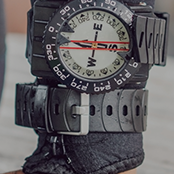
RAID NAVIGATION SPECIALTY IS “ON SPECIAL” You need to know where it’s at… and where you’re at too. So, your best bet is to signup for a RAID navigation specialty because it’s an essential for any new diver… or older divers who have trouble finding their way home! Underwater navigation involves using various techniques and tools to effectively orient yourself and navigate while diving. Here are some of the key methods and tips for underwater navigation you will learn in RAID’s navigation class: 1. Natural Navigation: 2. Compass Navigation: 3. Dive Planning: 4. Dive Safety: 5. Buoyancy Control: 6. Using Dive Computers: 7. Practice: By mastering these navigation techniques, SCUBA divers can explore underwater environments more safely and effectively while minimizing the risk of getting lost. This RAID specialty is port of our comprehensive core diver experience.
DEEP 40 Part of a Solid Foundation
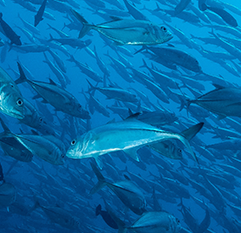
SEPTEMBER SPECIALS SCUBA diving to 40 meters (approximately 130 feet) deep is no simple matter… well, getting down is easy, but fixing things so that the way back up is uneventful, takes some care. RAID’s Deep 40 program will introduce students to the careful planning and additional skills that make diving to the limit of the recreational dive tables, fun, enjoyable, and as safe as possible. Here are some important guidelines for diving at this depth which the DEEP 40 program follows: 1. Academics and Skills Coaching: This makes sure students execute the open water dives with the mindset, equipment, techniques, and background understanding to keep them at their peak. All this help to ensure that the whole Deep 40 experience is a comfortable and effective learning adventure. 2. Planning Your Dive: Deep 40 students will build a detailed dive plan, including entry and exit points, duration, and maximum depth. They will use dive tables and a dive computer to calculate no-decompression limits and safety stops. And discuss the plan with their dive team to be certain that everyone understands their role and is confident to play their part. 3. Gas Management: As divers venture deeper, gas consumption increases. A critical part of this program is detailed gas calculations for a safe bottom time, ascent, and safety stop. (Deep 40 students have the option to use use nitrox or a suitable helium-based gas. 4. Equipment: This course will introduce students to the concept of detailed pre-dive checks, and using equipment rated for deep diving. This includes a reliable dive computer or depth gauge, dual gauges for redundancy, and appropriate exposure protection (wetsuit or drysuit). And of course, regulators suitable for deep diving. 5. Environmental Concerns: There are increased potential hazards at this depth, such as cold water temperatures, strong currents, and reduced visibility. There is often different and more fragile species of marine life as a diver travels deeper and each of these poses potential risks but added responsibilities. 6. Buddy System: At any depth, following the buddy system is important, but certainly below 20 metres, its importance become more critical. Always dive with a buddy for safety. Be as sure as possibe that both divers are aware of the dive plan and can assist each other in case of an emergency. 7. Emergency Preparedness: An important part of the equipment package for deeper diving is a surface marker buoy (SMB) to signal your ascent and make your location visible to boats, and dive team members (support) on the surface. It also pays to have a clear plan in case of emergencies, including a communication plan and access to first aid or oxygen. 8. Post-Dive Considerations: After diving to these depths, avoid flying or ascending to altitudes for at least 24 hours to minimize the risk of decompression sickness. Monitor your health after the dive and seek medical attention if you experience any unusual symptoms. Diving to 40 meters can be a rewarding experience offering stunning underwater sights, but proper training, planning, and safety measures are crucial. Always respect your limits and those of your diving partner. And signup for a RAID Deep 40 program to ensure a fun and safe dive. (PLEASE NOTE: Deco 40 has been updated as of November, 2024. See NITROX PLUS.
Lost at sea…
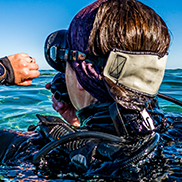
THEY SURFACED AND THE DIVE BOAT WAS NOWHERE TO BE SEEN The public broadcaster in the UK (the BBC) recently aired an interview with a couple of divers who spent 36 hours drifting off the Texas coast before being rescued by the US coast guard. Nathan and Kim Maker became separated from the charter boat in what was reported as bad weather and heavy seas. According to a fellow diver, the pair disappeared when “a huge swell comes in and engulfs Kim and Nathan totally. When the swell rolls out, they’re nowhere to be found.” And although the folks on the boat began to search for the pair immediately, they were gone. Few of us can imagine what it took for the Makers to hang on to their sanity and keep their spirits up while they drifted around, lost and alone. And the BBC story was a brilliant illustration of… well, the right words have to be gumption and faith. But, all that aside, is there something to be learned from their adventure… apart from never give up? As a dive agency, the answer to that simple question is, yes. We can learn something. It’s part of our job to modify what we suggest and advise students to do whenever an actual dive story presents us with an opportunity to share and learn. And this incident presents just that sort of opportunity. RAID offers a boat diving specialty. Perhaps this story points out that it’s time for an update. It’s time for our editorial team to put RAID Boat Diver on the list of course materials to be reviewed. It’s not that divers get washed away from their buddies on a regular basis, but it happens. Occasionally, too, a boat will leave a dive site when divers are still submerged. We can never make it certain that neither of these things happen again, but we can recommend some revised ‘contingency plans’! There isn’t space or time — and this isn’t the place — to deliver a whole diver manual for any RAID program, including Boat Diver. But here are some suggestions for any of you with plans to dive off-shore where tides, current, lumpy seas, or a tonne of other things might turn your day on its head. First is always carry a SMB (surface marker buoy) or a safety sausage. When diving current, a minimum of three (including a DSMB) per buddy team. is recommended. (Two for each diver is even better.) Also, carry a spool or small diver’s reel (a cavern reel is a good choice), and load it with #36 or #48 kernmantle. (Line a little stronger than the #24 line that cave divers use.) In fact, carry two. Make sure as well, that both you and your buddy have a “surface signalling device.” This could be as simple as a Fox whistle or a scuba diver’s air horn. Many recommend a signalling mirror as well. A signalling mirror is as useful as a chocolate teapot when it’s cloudy or at night. A better choice is a modern diver’s backup light (small and powerful). An alternative is a wreck-diver’s strobe light. But, in either case, do make sure the batteries are charged! There is a RAID instructor who always sits a very large, very colourful safety sausage in his place on dive boats before he jumps in the water. He explains this habit by saying: “that way, they can’t forget me.” He’s strategy seems to work and makes him a difficult passenger to miss. He has never been left behind! He is much too much of a presence for that. But for the more introverted among us, there are easier ways to track and log divers. And at very least, make sure that during post-dive roll call, your absence would be apparent. And finally, if your diving takes you well away from shore or you dive in strong currents, or your dive profiles are deep and long, we recommend packing a scuba diver’s GPS or rescue beacon in a pocket or pouch. There are several models on the market, so do a little research. They are not cheap, but they’re a bargain if they can save you and your buddy a night bobbing around in the ocean.
“Is that climb a grade 3 or 4?”
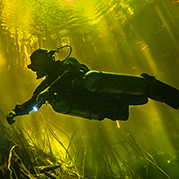
DOES DIVING HAVE A COMPARABLE SCALE TO WHAT ROCK CLIMBERS USE TO GAUGE THE DIFFICULTY OF A CLIMB… The short answer is: ‘Nope!” Followed by a pause and: “Well, not really.” Then there is another pause, pursed lips and a finger pointing skyward: “Hummm, actually, to tell the truth, it’s a long story…” Okay. So, when one thinks about it, there is no short answer. The situation is way more complex and the only answer is a hybrid one. Any climber, or downhill skier, can tell a lot about a rock or ice climb, or a ski run, from the grade it’s given. These grades are published and shared within each respective community freely. For example, a double black diamond at Whistler Blackcomb has a big sign at its entrance telling skiers what it is. They know the run is going to be a physical workout and a test of their skills before they point their skis or snowboard down it. Dive sites don’t have that. Along similar lines, an active ice climber knows that without the right experience and gear, attempting grade 3 ice has the potential to maim or kill. Divers are not quite so lucky. We are left to our devices when it’s time to compare our skills, the kit we’re wearing, our recent experience and cert level, with what the dive site requires. But there’s a lot of, what an engineer would call slop in that method. Essentially, there’s enough play in the moving parts that efficiency is lost. Efficiency is lost and there’s more. For example, do the challenges of an ocean wreck dive remain constant or are there variables at play… many of them hidden from the surface observer. Equivalent environmental variables are more apparent to a climber or skier. They can see and feel them BEFORE they set out. Divers have to guess. What complicates the issue in the diving world is we too often equate difficulty with depth, and depth alone. This is a simplistic comparison, yet divers and dive instructors commonly make it. By default, a trimix dive is classified as more dangerous than a nitrox dive, and both are said to be more risky than a 10 metre bimble on a tropical reef off Cozumel. But is that true? Can’t a diver suffer lung overexpansion ascending from 10 metres? Can’t a diver drown in 10 metres of water and be just as dead as one who drowned two or three times as deep? There is no argument that a trimix dive may be more complicated than the others. And convention suggests each requires a different level of experience (and certification). But is it that alone that makes one more dangerous than another? Is one really more risky while the other two and are both risk free? Certainly, swimming around the USS Oriskany’s sail and flight deck most would consider less dangerous than penetrating the wreck, but is that open water dive actually safer than a Cenote dive in Dos Ojos, Mexico, for example? Is one the equivalent of a blue ski run and the other a green one; or are they both the same as a grade 3 scramble up a mountain in the Dolomites? I’m reluctant to say. Oddly enough, it’s not unusual for an diver with just an OW20 to swim in a Cenote, but a dive below 20 metres requires additional work. Is that acceptable? It must be, since that’s what the community supports. But does the “slop” that’s present in the way we classify dive risk, correct and acceptable… in all cases… for every dive site? The truth is that divers are more of less left to “self-police” when they decide whether they have the chops to successfully dive a specific site. After all, there are no warning signs bobbing around on the surface. Perhaps that’s part of the attraction. But perhaps not. Maybe dive sites should be classified and signposted. Do divers have it wrong or are climbers and skiers living in a fool’s paradise? Lots of questions. The bottom line, then, has to be proceed with caution. Every dive has the potential to be a double black diamond or grade 4 ice. And the smartest approach is to treat them as such.
There’s more to this than a cert card
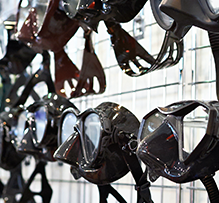
CUSTOMERS WANT MORE THAN THEY ASK FOR… Perhaps not every new customer that walks into a dive store, but most, in fact have a sketchy idea about the certification process. All the nonsense about people wanting “Their ****…” (and accepting it as fact) is poor market research. Actually, it’s not even close to market research, poor or otherwise. Worse, it leads to a missed opportunity. Every sale starts slightly differently, but when someone walks into a dive centre for the first time and asks about learning to dive (or getting their ****) the typical and incorrect response is to say; “yes, we can do that”, followed by something along the lines of “we have an open water class starting next week.” All that comes later. The immediate response should be to ask, “WHY?” The best sales people — people selling scuba classes, clothing, cars, boats, homes, patio furniture, whatever — want to know why. They want to know about the customer’s dreams. And if that sounds a little too New Age, Instagram Influencer to be effective, think again. Asking someone why they want to dive is the perfect ice-breaker. Everyone has their reasons. They range from, “I wanna dive the Titanic” to “I keep tropical fish, and…” A smart (effective and successful) sales person has the ability to match a customer’s dream to something they have “on the shelf for sale.” In the dive industry, what we have on the shelf is epic and exciting. It’s a dream fulfilled, a dream made real. In a lot of cases, making all that happen begins with an OW20, but it never ends there. Diving the Titanic is an obvious ‘No-Go’ but diving the Bianca C or Thistlegorm or USS Saratoga is possible… with imagination, the will to retain customers, and a few additional classes! Sell the dream.
Accident Analysis: a story of poor judgement and broken promises
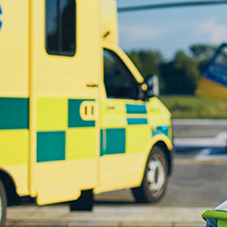
A HYPOTHETICAL NEAR MISS THAT HAS A LOT TO TEACH US The difference between going home after a day of diving or being strapped onto a hospital gurney while being prepped for several hours in a recompression chamber, can be the result of an margin of error as thin as a human hair, or a lapse of judgement as wide as the Channel Tunnel. Perhaps related to that, a strange habit of divers, especially technical divers, is to engage in what’s called ‘accident analysis.’ This exercise may appear to be ghoulish to outsiders. An act of morbid voyeurism. But technical diving is a high-risk endeavour, and it’s better to learn from the mistakes of others rather than educating oneself firsthand. That means digging around in other people’s’ misery to find what turned a great day into a nightmare, is a necessary and useful exercise. And that’s what this is; just a useful exercise, and nothing more. So, let’s do a little digging. I’ve avoided using names and the location has been fudged, but what follows could easily be based on an actual event. Your job is to identify the points where things went pear-shaped. Good luck and the prize at the end is that you can avoid making the same mistakes yourself: I hope. ______________________ Accident analysis is often difficult. Unfortunately, part of the challenge when deconstructing any diving incident is it’s often difficult to unravel which of the two extremes — human hair or 45-metre-wide tunnel — was a contributing factor. But occasionally, the answer is obvious and stands out like a nun dealing blackjack in a Las Vegas casino. Here’s one of those ‘nun in Vegas’ scenarios. Let’s say this incident involved two divers. Both certified instructors. One a very experienced technical instructor, but from someplace else and a stranger to local conditions. The other was a much less experienced technical instructor, but a local diver familiar with local dive sites and conditions. The highly experienced instructor was teaching a course to the lesser experienced one. So, the dive you are being asked to deconstruct was a training dive. For the record, the course was a trimix, sidemount CCR class. A highly technical program without a doubt. The dive was made from a boat working in an area where the prevailing current is always a factor. If you are thinking God’s Pocket, off Canada’s Vancouver Island, the Strait of Messina, between Sicily and the Italian mainland, or the Gulf Stream as it blasts along Florida’s east coast on its way to the British Isles and Northern Europe, you have the right idea. Several knots on a normal day, strong up and down welling on an extreme day. Not conditions for the faint-hearted, and always a physical and mental workout. The subject dive was on an extreme day. During the pre-dive briefing the charter captain mentioned the current was blowing. However, our divers opted to go ahead with their planned dive to 42 metres (about 138 feet) with around 45 minutes of bottom time. According to all reports, the dive was a challenge. The experienced technical instructor admitted afterwards it was one of his toughest dives. But he and his student put in the planned bottom time in spite of everything. It seems, that during their ascent, holding the required staged decompression stops was a challenge. Partly because of this, and because the student indicated ‘I’m tired,’ the pair added more than 10 minutes to the six-metre stop. Back on the surface, the student showed signs of a serious, possibly neurological, DCS hit. Evacuation ensued followed by recompression and a hospital stay. The required reports were filed and during the resulting investigation, it was discovered the student had a history of DCS and other medical challenges including a suspected PFO. However, these episodes were never mentioned in medical waivers, or pre-course conversations, or dive briefings. Nor had incident reports about them ever been submitted to the agency. In this case, someone dodged a bullet, for sure. This was a near-miss that could easily have had a much worse outcome. But instead, it turned out to be a good learning opportunity for us all. Now, did you spot the ‘errors?’ Diving, especially technical rebreather diving, is about balance. It’s about knowing limits and working within them. For example, most would agree a sensible starting point would be to draw boundaries around a training dive. Training dives are supposed to be controlled and somewhat protected. Not necessarily easy, but not one of the hardest dives an experienced technical instructor has made. Even when it’s a CCR course. Accordingly, a training dive is not the best platform from which to launch an all-out attack on any limits or to beat down the best practices that support ’em like fence posts. Add to that, what for most divers even on a good day, would be challenging conditions, and the odds against a good outcome are building. And then, opting to push limits and undertake a tough dive in unfamiliar gear (managing a sidemount rebreather and bailout bottles), adds another level of complexity. Put all this in a blender and give it a stir, and most would consider the results a nasty concoction… something to be avoided. And yet, all this happened. Certainly, we could all point fingers, but what are the lessons? When and where did this all start to go wobbly? Perhaps we can start with a little self-reflection. As a community we have a loose approach to applying what we know is best practice to every dive we make. We get complacent. Also, too many experienced instructors allow slop when they apply the “spirit of the law” to the advice offered in course standards. Some also forget that not everyone has their experience and comfort when conditions turn tough. Of course, this attitude is ill-advised, but was that attitude a factor in this case and it is really that unusual? Diving in marginal environmental conditions is always a dodgy choice.
Learning about Twinset diving
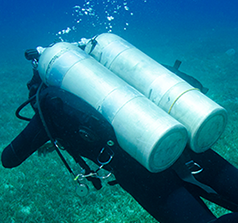
RECREATIONAL DIVERS ENJOY THE BENEFITS TOO Diving with two tanks on your back was once part of a sort of right-of-passage for anyone who thought of themself as a budding techdiver. Double tanks (joined by an isolation manifold) where once the exclusive kit configuration for cave and deep wreck divers. But times change and who doesn’t appreciate the extra safety, extra dive time, more stability, and convenience that a twimset can deliver? And with this specialty program, almost anyone can spice up their diving adventures and learn new, valuable skills from the experts. Diving with double tanks, also known as twinset diving was originally a convenient way to increase the breathing gas available to divers for longer dives in either a hard or soft overhead (inside a cave or wreck), or when doing staged decompression dives. It was the norm when divers began to push their adventures beyond the limits of traditional recreational diving. But recreational divers soon realized that the advantages of having backup gas, and plenty of it, was attractive to them also. So, to meet this need, RAID developed its TwinSet Diver Specialty to teach these divers the best, safest, and most appropriate techniques to venture into this type of diving. The course teaches everything a diver needs to know about how to get the most benefit with the least fuss from twinset diving. If you’re looking for a course to challenge you, but also to add something exciting to your diving, RAID’s Twinset Specialty is worth taking a close look at. Advantages of diving with double tanks include:

